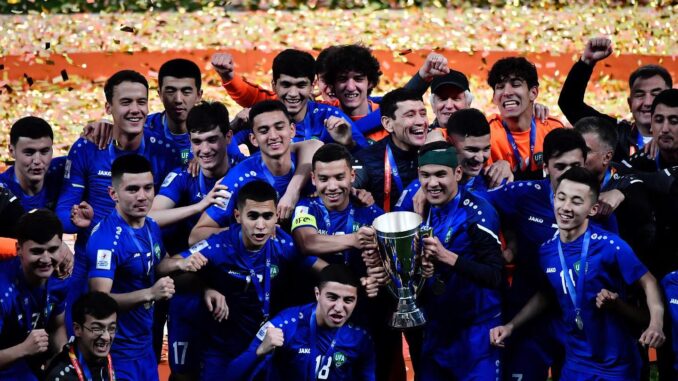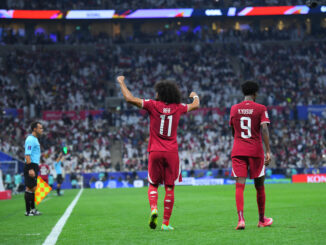
Following their run to the final of last year’s AFC U23 Asian Cup, Uzbekistan went one step further in clinching the AFC U20 Asian Cup in front of a sell-out Tashkent crowd on Saturday afternoon.
Clinching their first title in their history at this age range, Uzbekistan’s presence at the top of the Asian football tree can no longer be considered a surprise.
Year after year, generation after generation, the Central Asian giants are not only competing, but succeeding against the very best across the continent. The final step seems inevitably destined, for them now to fight for senior World Cup qualification over the coming three years.
Two years of success on the pitch was replicated in the stands, as the country once again rose to the occasion in hosting a seamlessly run tournament that ticked all the boxes. Having been pushed towards the hosting of both the U23s and U20s, at the expense of bidding for the senior edition of the Asian Cup in 2027, the hard yards are slowly gaining recognition for a strengthened push in the coming decade.
While there were positives to be taken from Uzbekistan’s rise to the top, all-in-all the tournament won’t be remembered as a classic. Following a five-year absence due to the COVID pandemic, a lack of drama, or consistent quality was a regrettable let down, after such a hopeful build-up.
In the main, tactical pragmatism and squad rotation disrupted any positive flow that could’ve been had.
While there were clear standout individual performers on show; the likes of Kuryu Matsuki, Ali Jasim, Kang Seong-jin and eventual player of the tournament winner, Abbosbek Fayzuulaev, few sides, even the triumphant Uzbeks, were able to inspire much excitement in the final third, defined by their paltry three open play goals scored in six matches on their march to the title.
Defensive solidity wins out
Following Wednesday’s penalty shootout drama, in the end Saturday’s final between the hosts and outsiders Iraq failed to deliver the blockbuster ending we’d all hoped for. Captain Umarali Rahmonaliyev’s second half penalty proved the difference, in a comfortable, if not entirely convincing performance from the Junior White Wolves.
Ravshan Khaydarov’s side in the end suffered from the same frustrations in front of goal as they had done throughout the competition.
They can point to being the most stable team of the tournament, propped up by the solid presence of Abdukodir Khusanov in central defence, and the effortless composure of Bakhruzbek Askarov in front of him. Uzbekistan were rarely troubled throughout, only conceding once on their run to the final.
That said, back-to-back shootout victories, plus a late penalty winner in the final told the full story for a team who, despite an abundance of talent across the pitch, missed a real front man to finish it off.
In the aforementioned Fayzullaev and Rahmonaliyev, Uzbekistan clearly have two fine ball-playing and creative support strikers, but time and again they needed a focal point to feed. Pakhtakor frontman Polakhoja Kholdorkhonov resembled their best source of threat, but even he seemed better equipped to drift wide and create for others rather than take on the goal scoring burden.
In the last few years, we’ve witnessed Uzbek football evolve from their archetypal defensive image of the past, to the more free flowing approach instilled by Timur Kapadze with the U23’s and club side Olympic FC.
While the U20 champions can hardly be criticised for being as pragmatic as Uzbekistan generations of old, there’s no doubt they’d have surely been eliminated early if it wasn’t for their defensive structure and occasional individual inspiration; highlighted by keeper Otabek Boymurodov saving three in their penalty shoot out victory over South Korea.
Their opponents in the final, Iraq, did threaten in advance of the final to become the perfect counter to Uzbekistan’s more rigid approach, by playing a more expressive and care free style of attacking football.
In one of the finds of the tournament – exuberant winger Ali Jasim – they had a livewire who consistently offered an attacking threat. Alongside the all-energy charisma of captain Abdulrazzaq Qasim, very much in the mould of Yasser Kasim from 2015, Iraq were a worthy finalist, upsetting the odds in both a later quarter-final win over Iran, and their penalty shootout victory against Japan.
While the title was one step too far for the Iraqis, with qualification for the FIFA U20 World Cup guaranteed, coach Emal Mohammed, a former winner of this tournament as a player, was vindicated against a raft of pressure and doubt heading to Uzbekistan. While many opted for a conservative approach in Uzbekistan, Iraq were one of the few teams to play with their heart on their sleeve; and it showed in their narrow progression from day one.
The final in itself was an anti-climax, but one with a wider narrative to be had. For two West Asian nations that have been somewhat side-lined by the progress and investment being made across the region over the last decade, the success in both making the final, with the U20 World Cup ahead of them, hints to the developing depth in Asia and tantalisingly poses the question of what could await the continent’s football in the coming years.
East Asia’s big two lose out on penalties
While on paper the final represented the future of Asian football, those who stumbled in the final stages very much still represent the existing order. Last Wednesday, both Japan and South Korea bowed out at the semi-final stage on penalties, emblematic of the whole tournament that offered a number of promising individuals, but very few cohesive team efforts.
Their exits felt all too familiar; two coaches in Koichi Togashi and Kim Eun-jung, opting to rotate their squads throughout the tournament, preferring wider development over selection of their best elevens, even at the sharp end of things, which proved fatal to their chances of clinching the title.
Japan were anchored by the mercurial Kuryu Matsuki, showing glimpses of that generational talent, that we’ve been regularly exposed to in his formative years. Either as a deep lying playmaker, or in support of the attack, he offered vision, dynamism and pleasingly a bullish confidence in goal scoring areas.
Alongside Matsuki, the threat out wide came through Sota Kitano and Takatora Einaga, despite the latter regrettably being confined to a regular impact substitute role. As was the eventual golden boot winner Naoki Kumata, who’s uncompromising style and unerring finishing made him one of the clear standouts of the tournament, continuing on his prolific record in the FC Tokyo youth set up.
As it was, all four of Japan’s standout attacking talents were left on the bench against Iraq, together with regular keeper Ryoya Kimura and usual staring defender Niko Takahashi. While their appearances late on forced extra-time, and then penalties, another limp shootout exit for the Japanese encapsulated a campaign that could have offered so much more.
Similar reflections will be felt by South Korea, having also rotated their squad for their eventual semi-final defeat to Uzbekistan.
Over the course of the tournament, Korea resembled one of the few teams that could potentially steamroll their opponents; but in reality, that only materialised infrequently. Their highlights included midfield duo of Lee Seung-won and Bae Jun-ho, operating as an all-action tandem, while the services of Kim Yong-hak and Kang Seong-jin from out wide were a constant threat on the counter.
At the other end, arguably the most complete goalkeeping talent on display was Kim Joon-hong. Throughout he offered leadership, a reliable aerial presence and reactionary shot stopping ability. A momentary lapse that gifted China their opener in the quarter-finals, did finally reveal his age and inexperience; a raw talent that will seek consistent domestic minutes on loan with Gimcheon Sangmu in the coming year.
Heartbreak as four miss out on U20 World Cup qualification
The quarter-finals in many ways felt like the only truly perilous stage of the tournament, with four head-to-head playoffs set up, for the winners to progress to Indonesia this summer to compete at the U20 World Cup.
Iran became the first major scalp of the round, losing out to eternal rivals Iraq through a last-minute Ali Jasim winner; despite Team Melli Javanan operating quite strongly in the group phase of the tournament.
Centre back and leader, Amin Hazbavi, weeks on from his similarly impressive performance against Al-Hilal for Foolad in the Champions League, illustrated his maturity and impact across the pitch, from resolute defending to popping up with two goals in attack for Iran. The supporting cast of Mohammadreza Torabi as a deep midfield anchor caught the eye, as did the energetic, if a little inconsistent, wing wizardry of Erfan Ghorbani.
In a similar vein, Australia experienced significant highs and lows; lacking initially against Vietnam, before steeling a march on Iran, a 9-1 victory against Qatar on the final match of the group phase inflated hopes of U20 World Cup qualification, that couldn’t be matched.
Stifled in their eventual penalty shootout defeat to the hosts, Australia were denied a place in Indonesia, but already through the glimpses of centre back Joshua Rawlins, the energetic bursts of Panashe Madanha and creative guile of Adrian Segecic, there are plenty of positives to take away from the tournament irrespective of their early exit.
Elsewhere, expectations were arguably more predictably met, in quarter-final exits for Jordan and China. The former, however, were a breath of fresh air, offering a dynamic attacking thrust we haven’t seen too often from Jordanian football; in particular through the positive play of wide man Ali Azaizeh.
China, on the other hand, reverted to a defensive first, reactive set up, that opted to sit back for an hour before attempting to hit their opponents on the break late on; a tactic that very nearly upset the odds against Japan in their quarter-final.
Their highlights came in the exposure of a developing group of Uyghur talent. Building on the breakthrough of Mirahmetjan Muzepper at senior level, this U20 squad featured no fewer than six players born in the northwest of China, with Mutellip Iminqari and Afrden Asqer particularly starring in what fleeting attacking forays they were afforded by the broadly negative tactics of their Spanish coach Antonio Puche. A developing narrative to look out for in the coming years.
Gulf expectations dashed as questions start to be asked
While the tournament won’t necessarily be known for a single team rising to the top emphatically, for some it will be remembered for all the wrong reasons, as a few nations failed to build on previous momentum, facing swift elimination at the first hurdle.
None more so than Qatar, who capitulated in a meek group stage exit. Fresh off the back of a regrettable senior World Cup, a meagre Gulf Cup and Al-Duhail’s humbling in the Champions League final last month, the Qatari youth in Uzbekistan similarly alerted observers to a rapid decline across the board in the nation’s football.
While there were individual examples of talent within their squad, the cohesion and balance of the side felt all off. Ironically, the only sense of unity seemed to materialise in their misjudged high line against Australia, the key catalyst behind yet another infamous hammering. On paper, the Aussies steamrolled the Qataris; in reality, the Young Maroon obliged by opening the flood gates themselves.
There were similar pains for neighbours and outgoing champions Saudi Arabia, if not so emphatic. Again, question marks over the coaching were the overriding theme following their early exit.
The team showed strength, and defensive solidity, but little in the way of attacking spark to support an all too often isolated Abdullah Radif at the focal point of the Saudi attack. There remains a couple of gems coming through, particularly in the central midfield pairing of Musab Al-Juwayr and Suhayb Al-Zaid, but instead they will have to wait and hope to be deployed sufficiently in Saad Al-Shehri’s Olympic games chasing U23 squad next year.
Elsewhere, hopes were dashed for Central Asian duo Tajikistan and Kyrgyzstan; the worst performance at this level for the former, following group stage progression at the previous two U19 championships. While some could argue solid performances from Vietnam and Syria deserved more, the same couldn’t be said of Oman or U20 World Cup hosts Indonesia, who risked feeling over run at times in their early group stage encounters.
For Indonesia, they already had qualification secured, but instead their performances in Uzbekistan provided an eye opener for what to expect in three months’ time.
Asia’s five-star list head to Indonesia; led by Uzbekistan as U20 Asian Cup champions for the first time. While the tournament may fail to linger long in many people’s minds, for Iraq and the triumphant hosts, their progression to the final indicates a promising future, one that is now set to take on the rest of the world at this year’s World Cup.
Photo: Uzbekistan Football Association
Listen to the latest episode of The Asian Game Podcast




